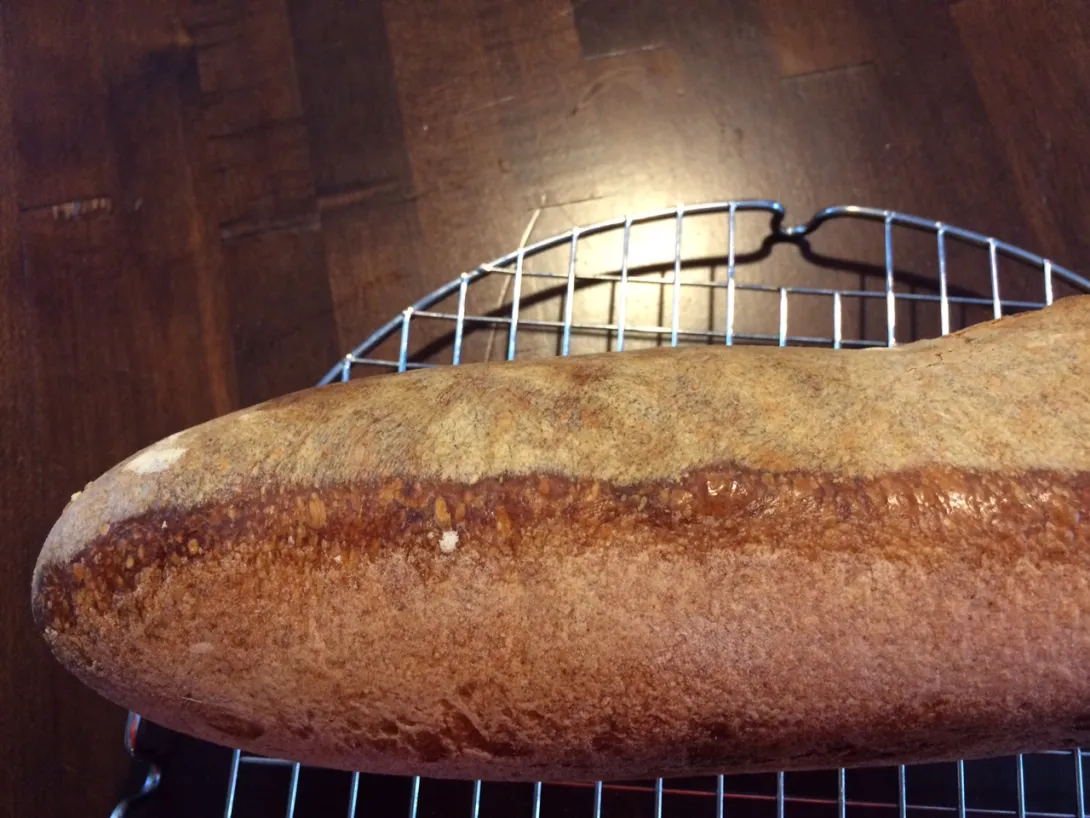
Hello Good People
I sure need some help ... got 2 problems and do not know if they are connected . Started baking again after two years off, and am extremely frustrated
Until getting into the oven , everything seems fine, good rise, overnight proofing . Oven 475 F.
The bread rises but it looks like it can not stretch enough , the bottom is not flat but oval and the final shape is almost round, inside is too dense.
In addition , everything is white (also bottom), but a stripe around the periphery , which is very nice golden brown, Steam by vaporizer in the first 8 minutes.
Never happened to me in the past, same recipe, however, oven is new
It will be great if somebody knows what is going on here..
Sounds to me like the two problems are related. Both seem to suggest that there's insufficient steam in your oven and that the crust is drying out early in the bake; the whiteness on the top of the loaf and the difficulty with oven spring both seem like symptoms of that.
The band of reddish brown probably indicates an area that was protected from the drying effects of the oven for longer than the rest of the crust; possibly this represents some bit of dough that was able to expand upward partway through the bake. Much like how the score(s) on a loaf can be much glossier than the rest of the crust, it benefited from the hydration of the dough itself.
I would expect that the bottom would be less white than it is if this is the reason, but perhaps it's heavily floured.
Have you baked a loaf like this in this particular oven before? It sounds like most of your baking predates this oven for you, so it might be that your old steaming method is not a good match for this equipment.
Additionally, how do you proof your loaf before baking? Do you keep it covered to help prevent it from drying out and having a skin form prior to going in the oven?
I suppose it's possible that dough development and proofing times could be causing the trouble with oven spring, but I'd look at the steaming method and how you're proofing first.
i proof in the refeigirator , 12 hours , covered.
It is true i did not succeed with this oven , maybe something to do with it ? I spray in the oven eveey minute for the first 10 minutes
From your description of the dough (can't stretch) and the loaf (bottom is round and inside too dense), it sounds as though the dough hydration is too low. Give us your recipe, and perhaps we can shed more light.
Ford
thank you for your help
here is the recipe (wildyeastblog)
Desired dough temperature: 76F
Ingredients:
Method:
- See more at: http://www.wildyeastblog.com/more-sour-sourdough/#sthash.7y29bwiv.dpuf
I must say I used this recipe many times in my former baking period
Hello GilBi,
I calculate your hydration as 66.9%. This low hydration, by my standards. The hydration of my "Deli Rye" is 73%. my 50% whole wheat is 79%, and my white bread is 75%.
I suggest you add more water to your recipe to bring the hydration up to about 75% (Add 656g of water instead of 560g.) This may make your dough a little more difficult to knead but will allow the dough to be stretched more easily and to rise better. To handle the dough use a light dusting of flour on your counter and on your hands. Make sure the loaves have risen sufficiently by using the two finger indentation test.
I wish you the best of baking success.
Ford
first 10 minutes is not at all what you want. I would use Sylvia's steaming towels or David's Steaming la=a rocks or a combination of the 2 - Mega Steam! Get a couple of 99 cake pans and put a rolled up kitchen towel in each of the adn fill them half full of water. Preheat the oven to 500 F and when it beeps telling you is at temperature, Load the pans on the bottom rack of the oven right below the baking stone on the rack above
15 minutes later the stone will be at temperature and the steam billowing. Do not put your face near the oven door when you open it to load the bread. Load the bread, close the door and turn the oven down to 450 F.for 12 minutes of steam. Then take out the steam pans to finish the baking.
Lava rocks can replace the rolled up towel using the same process. No more crust setting before the spring is done!
Happy baking
If all other factors are the same and the difference is the oven... then maybe a little more detail about the oven might be helpful. Gas or electric? Does it have a fan?
Hi GilBi,
This is what I would do.
Regardless of hydration, I would try to cover your bread for the first 10-15 minutes of baking. Use a Cloche or some kind of a lid to help trap steam. I believe that your recipe is solid but the crust is drying out too fast.
If you don't have any kind of a lid or stainless bowl that you could use, just use a spritz bottle and spray water on the bread before loading and then again every couple of minutes after loading for the first 10-15.
Are you baking on a pizza stone? That can help too.